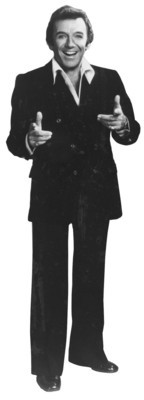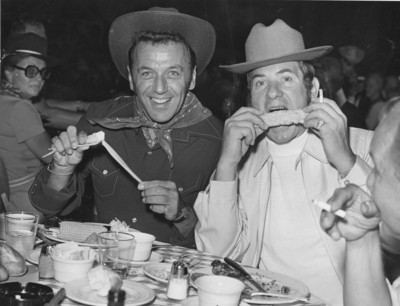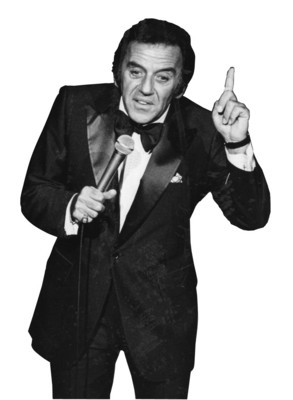A Stand Up Guy
EDITOR'S NOTE: This is the last story in the opening run of an occasional series highlighting performers who played an interesting role in the history of entertainment in Las Vegas. The series will return for four weeks in February.
Norm Crosby can walk out on any given stage, a smile on his face, a twinkle in his eye, and instantly you know you're in for a good time. He exudes warmth, a trust, which is rare in many comics. But it's not until he opens his mouth and the jumbled words come out that the fun begins.
He is called "The King of Malaprop" because of his familiar usage of incorrect words within the text of his jokes.
"That's what the people expected of me. I think it's the most wonderful thing in the world to have an identity, something the audience can remember you for," he told me. "I think it is the biggest plus the performer can have is to be a little unique."
Offstage, Crosby is an intelligent, erudite and sensitive man who is generous with his time. You saw him most recently as a co-host for the Jerry Lewis Labor Day telethon. He also is a trustee of the Hope for Hearing Foundation at the University of California, Los Angeles.
(Born Sept. 15, 1927, Crosby suffered hearing problems while serving in the U.S. Coast Guard. Developing an intense interest in the hearing impaired, he was the first national chairman for the Council for Better Hearing and was appointed special ambassador for Better Hearing and Speech Month by President Reagan.)
Crosby's path to Las Vegas began in the company of another former Las Vegas legend, Robert Goulet.
It was 1963 and Crosby was the opening act for the singer who had become a Broadway star in "Camelot." Opening on Labor Day at the famed Concord Hotel in the New York Catskills, Crosby recalled meeting Goulet backstage. "I said, 'Mr. Goulet, I'm Norm Crosby,' and I asked the question you always ask the headliner, 'How much time should I do?' And he looked at me and he said: 'I don't know. How much time should I do? I've never done this before.' "
From that moment on, the two men became friends; in fact, Crosby attended Goulet's funeral in 2007. "We had magic -- great chemistry, (and a) delightful relationship," Crosby said. "I was on the road with him when both his boys were born. We were friends. We were pals. He was a super guy."
After their Concord engagement, Crosby began a national tour with Goulet. Their first job was in Las Vegas in late 1963 at the Flamingo Hotel for four weeks. The pair also had a deal at the Sahara.
After three years touring together, Goulet and Crosby separated amicably.
"There's an occupational hazard in opening for a headliner because usually the opening act gets minimal billing, minimal attention and you get off (the stage) because everyone's waiting to see the star," he said. "And Bob and Norman (Rosemont, Goulet's road manager) were very, very kind to me in that it was always 'Robert Goulet featuring Norm Crosby' or 'Robert Goulet with special guest star Norm Crosby,' so they allowed me to grow anywhere I went with Bob. I was almost like a co-star, you know. But I was still opening for him. They were considerate. Thanks to that I was able to eventually go back to the same places and headline myself."
Crosby always has been adamant about his style of humor. "Being clean was a choice." His manager once told him that "there are different types of laughter. There is shock laughter, where you startle the audience and they laugh. But on the way home they (the audience) don't want to remember that kind of laughter. They think, 'It was OK. But I can't tell that stuff to anybody.' "
The comedy today on cable television is disturbing to Crosby. "I think that's shock laughter. People laugh at it because they're startled, you know. I don't think it's lasting. I don't think it's permanent. I think it's a substitute for talent, rather than being clever and thinking sharp and thinking funny. (Some of the new comics) try to be raw and scary as they can. It's not my style."
Crosby's style of humor was in demand after his run with Goulet and he made his own deal with the Sahara that lasted about five years.
"I started working up and down the Strip because in those days it didn't matter, they didn't care if you closed at one hotel -- you could open the next day across the street," Crosby remembered.
"It was a marvelous, marvelous time to be in Las Vegas."
"I tell you, there wasn't anything like it," Crosby added. "It was a bonanza for the performers because we were treated like royalty and we got sumptuous dressing rooms, and fabulous suites and just a lot of everything. I mean they were brilliant people and they knew how to treat the performers, because they weren't philanthropists and they weren't awed with the stars. It was just they had the basic knowledge, they had the insight of realizing that when you treat a performer well, then you get the best out of that act when he goes out on the floor to work."
The 1960s and 1970s were "golden days" on the Strip for many performers. During this time Crosby worked with such headliners as Tom Jones and Gladys Knight.
"I had a long-term deal with the Sahara," Crosby said. "As a matter of fact, I replaced Don Rickles. Now, Don Rickles was the headliner in the Sahara lounge for years. And in those days the lounges were extremely important and a big, big ... part of the Las Vegas picture.
"The lounges were integral (and they) produced a lot of the headliners," he continued. "They got started in the lounges and moved into the big room, ... which is exactly what happened (with me). They made Don Rickles a headliner in the main room and I took over the lounge. I stayed there a while, a few years. And that, too, was wonderful."
There was camaraderie among the performers.
"There was no such thing as a 'dark room,' " Crosby recalled. "If somebody was ill, the people across the street would come over and fill in. I did that. I remember when Connie Stevens had some problem, and ... I went over. I was working with Tony Bennett at the Sands. And it was Wayne Newton who went over and opened the show for Connie. And then as soon as I finished, I ran over and I closed the show after Wayne. You know the hotels covered each other, and helped each other."
With today's corporate competitiveness, it's hard to imagine a time when entertainers promoted each other as friends, but Crosby experienced it.
"I remember Bill Cosby and I were working in Vegas at the same time a lot, you know," Crosby said. "We would bump into each other, coincidentally. And Bill would tell the audience, he'd say: 'You saw me. You're not going to come back here, so why don't you go over and see my cousin Norm? He's wonderful!' And I used to do the same thing (for) him. I mean we all did that. We did that for each other, because it was the nice thing to do."
I asked Crosby about his thoughts regarding the Las Vegas audience.
"They were always wonderful for me. I had the best times in Las Vegas," he said.
"Of course, it was a melting pot in Las Vegas," he added. "You got every age level, every ethnic background, every social aura -- it was an absolute Americana audience ... people who were there to celebrate occasions; people who were there to gamble; people who were there because they were awed by the whole Vegas operation. Tourists. But there was one thing they had in common: They came into the showroom to be entertained and have a good time."
Crosby described his technique for performing comedy.
"I don't do the same show twice. I've never done a show word for word. You get a feeling for the audience. You're supposed to be able to size them up and get a basic instinct for them when you walk onstage. It's a gift. You have to be able to do that."
But he knows today's comedy scene is different, and many young comics are thrust into fame -- often in the form of inane situation comedies -- before they are ready.
"They didn't have to go through the little clubs that we did. The Las Vegas engine like we did. They go to Las Vegas now and they're headliners," he said. "We worked co-stars and opening acts, you know, until we learned the trade and graduated."
However, he remains optimistic about the prospects for comedy, because some of the stand-up comics who went to television were talented and successful, such as Ray Romano, Paul Reiser and Jerry Seinfeld. "They all headlined shows. They were taking from comedy. ... Most of the successful, long-running TV shows were featuring comics, rather than actors and actresses."
One advantage comedians enjoy is the need in human nature to laugh.
"Humor is therapy, a way of coping. A way of combating negatives," Crosby said. "It's a way of healing oneself, of easing the pain of things that are bad that happen.
"There's a lot of pride in being a performer," he added. "You know, a responsibility."



















